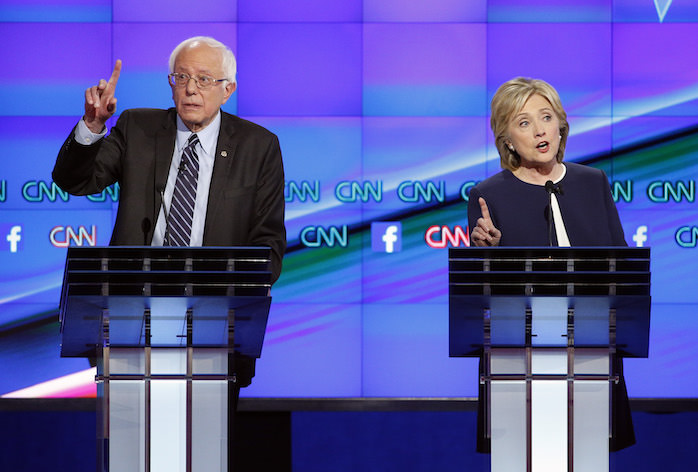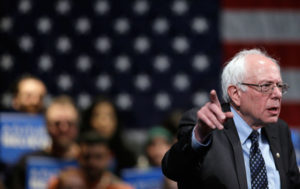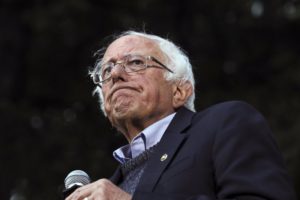The Democratic Debate: Only Sanders Gave the Poor Their Due
Vermont senator called for a revolution in banking, health care, child care and education Clinton kept her focus on the middle classThe Vermont senator called for a revolution in banking, health care, child care and education. Sen. Bernie Sanders of Vermont and Hillary Rodham Clinton during the CNN Democratic presidential debate in Las Vegas on Tuesday. (John Locher / AP)
Sen. Bernie Sanders of Vermont and Hillary Rodham Clinton during the CNN Democratic presidential debate in Las Vegas on Tuesday. (John Locher / AP)
With the exception of Sen. Bernie Sanders, the Democratic presidential candidates didn’t pay much attention to the very poor during their debate Tuesday night. The middle class, as usually is the case in such events, got most of the attention and sympathy.
Sanders talked about the “27 million people living in poverty” and noted the incongruity of such a rich nation having such a high number of impoverished people.
His main opponent, former Secretary of State Hillary Clinton, also spoke against the income inequality hitting the poor and the middle class. But she wasn’t as outraged at big business as Sanders was, and her solutions would not mean as great a change in American life.
The other, lesser-known candidates—former senator and former Gov. Lincoln Chafee of Rhode Island, former Gov. Martin O’Malley of Maryland and former Sen. Jim Webb of Virginia—weren’t real factors in a debate dominated by the Clinton-Sanders rivalry.
As for the theatrics, Clinton looked sharp, was articulate and showed none of the defensiveness that has characterized other appearances. She made a point of noting that if she wins, she’ll be the first female president and that “mothers will say to their daughters, yes, you too can grow up to be president.” It was a plus for her, and perhaps a notice to those begging Vice President Joseph Biden to enter the race that he’d be in for a tough campaign.
Sanders, in his biggest appearance on the national television stage so far, was forceful, although he couldn’t match Clinton’s debating skills or ability to quickly shift from one subject to another. Neither has much of a sense of humor.
Sanders should get an award for classy behavior for coming to Clinton’s defense over the email controversy that has dogged her through the summer. Moderator Anderson Cooper pressed her on the subject, which will be part of the questioning she’ll face when she goes before a House committee next week. It’s supposed to be investigating the deaths of Americans in Benghazi but is more interested in her emails. “This committee is basically an arm of the Republican National Committee,” she said. Then Sanders stepped in. “Let me say something that may not be great politics, but the secretary is right—and that is that the American people are sick and tired of hearing about the damn emails,” he said. “Enough of the emails. Let’s talk about the real issues facing America.” Clinton smiled and the two shook hands.
Sanders said the persistence of poverty was one of those real issues.
Statistics support him. The Center on Budget and Policy Priorities reported this month that the poverty rate in the country was “substantially higher” last year and “median income markedly lower than in 2007, before the Great Recession.” It also noted that median income overall was unchanged for the third straight year.
Sanders said that in addition to there being a large number of very poor, “the middle class is disappearing.”
He offered a critique of “the casino capitalist society” and reiterated his call for high taxes on those who profit from an unequal society. “Congress does not regulate Wall Street,” he said. “Wall Street regulates Congress.” In calling for universal health care, day care for young children and free public university and college educations, he invoked the example of Denmark and its social democracy.
“I love Denmark,” Clinton said. “We are not Denmark. We are the United States of America.”
Clinton also said, “I am a progressive, but I am a progressive who gets things done.”
She said companies should share profits with the workers who create them. Loopholes helping businesses should be plugged and lawmakers should make sure “the wealthy will have to pay their fair share,” she said.
Clinton criticized Sanders for his failure to support the Brady Handgun Control Act and for his general caution on the gun issue. He said the issue is complex, especially for a senator from a rural, hunting-loving state like Vermont.
They disagreed, to some extent, over Edward Snowden, now in self-imposed exile in Russia after taking information about government surveillance of U.S. citizens and revealing it. Sanders said Snowden “played a very important role.” He acknowledged that Snowden broke the law “and there should be a penalty for that” but said that the public benefit of his act should be taken into consideration. Clinton said, “I don’t think he should be brought home without facing the music.”
Sanders, by invoking the misery of the poor as well as the middle class and by his scornful reference to “casino capitalism,” offered the best, most radical path to full economic recovery. At the end of the two hours, the differences between the two were clear—the conventionally moderate Clinton versus Sanders, who wants a revolution in banking, health care, child care and education.
Your support matters…Independent journalism is under threat and overshadowed by heavily funded mainstream media.
You can help level the playing field. Become a member.
Your tax-deductible contribution keeps us digging beneath the headlines to give you thought-provoking, investigative reporting and analysis that unearths what's really happening- without compromise.
Give today to support our courageous, independent journalists.






You need to be a supporter to comment.
There are currently no responses to this article.
Be the first to respond.